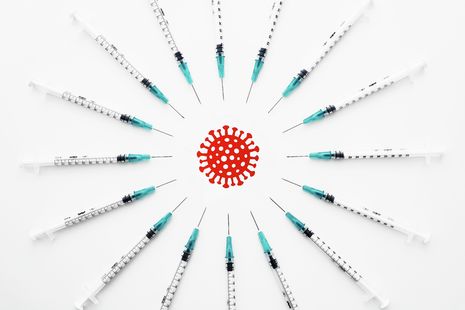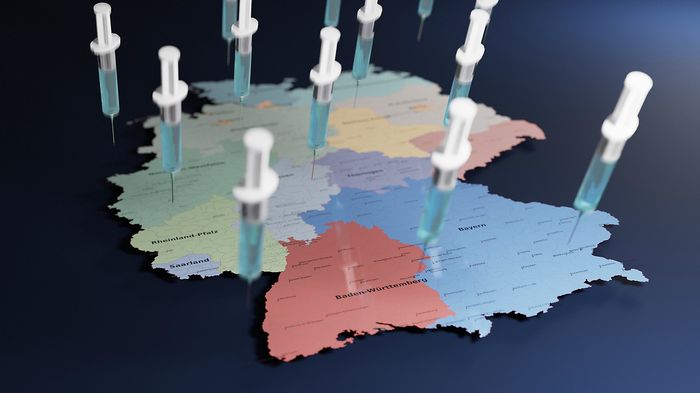Boosters won’t save us, only competent governance can
Omicron is just the latest variant in our battle with Covid. Laura Solomon discusses the journey which got us this far, potential roads to recovery, and concerns for the future

The Omicron variant of Covid is posing a new threat to the efficacy of the vaccine and sustainability of the National Health Service (NHS). Further restrictions and vaccinations are being initiated to alleviate pressure on the NHS, but surely this pressure is not only a consequence of a decade of austerity, the product of a system stretched to breaking point, and of Boris Johnson extending the vaccine rollout programme to possibly distract from previous government covid-handling mistakes. We need to divest from preventative measures at this point and realise the urgency of the NHS crisis, increasing much needed funding to emergency services. With three quarters of NHS staff reportedly considering leaving the service altogether, the ‘crisis mode’ of the NHS is unsurprising, especially if you have kept an eye on the Royal College of Emergency Medicine’s reports.
In 2019 the Royal College of Emergency Medicine claimed that ’the situation afflicting our Emergency Departments has become seemingly normalised with a ‘chronic crisis mode’ that does not allow staff to deliver the quality of care they would wish and patients should rightly expect’. As Wes Streeting pointed out when questioning Sajid Javid, the NHS went into the pandemic with record waiting lists and staff shortages. The reality is that the NHS has been at breaking point every winter for over a decade, the pandemic is merely a catalyst for the issues that come with an already decaying system. This was inevitable.
“[relaxing restrictions] gave us a false sense of security and perhaps complacency”
So the question remains, ‘will we go into lockdown due to omicron?’ I propose an answer that may not fully satisfy — we won’t go into lockdown because of omicron, we will go into lockdown because of systematic underfunding of the NHS.
Relaxing restrictions not only spelled danger, with increased social gatherings leading to a rise in cases, but gave us a false sense of security and perhaps complacency towards restrictions that should never have been relaxed. So now, increasing restrictions seems for many to be a precursor to a lockdown — a story we’ve all become accustomed to hearing. Except this time it’s different. This time it feels like: ‘if we cannot accept living with Covid now, when will we?’ Will lockdown become the go-to response to the NHS being under stress? Are lockdowns the government’s substitute to supporting the NHS through adequate funding?
Introducing third booster jabs is also a measure which on one hand is medically effective, but strategically complex. By placing so much emphasis on the booster the government shifts the blame for potential increased hospitalisations onto the British public.). Is it socially just to treat vaccines as a long-term-solution, when global distribution remains structurally Western-centric? With the current roll out of initially unplanned booster shots, the COVAX scheme has once again suffered as it is due to fall significantly short of its goal of providing 2 billion shots worldwide by the end of 2021, currently sitting at 698 million at the time of writing. Initial rollout of the vaccine in the UK was undoubtedly a huge success (credit where credit is due) and a third dose is certainly necessary for at risk members of society who otherwise face Covid in the ICU, but a third dose for 18 year olds seems excessive to me.
“Prevention is undeniably necessary but, to me, it seems too late”
After all, the telos of the booster is to reduce hospitalisations, alleviating pressure on the NHS. Not only does the use of a booster jab for 18-year-olds fail to fully address the root cause of the NHS’s current state of emergency, but it also draws valuable resources away from emergency care. Prevention is undeniably necessary but, to me, it seems too late.
Essentially, the government seems to be promoting vaccines as an attempt to plaster gaping cracks in the NHS. There is a political agenda to this, a reliance on the transitory memory of the voter; the rhetoric and optics of the vaccine rollout extend the positive legacy of Boris Johnson, pacifyinging memories of corrupted contracts, and the lethal ‘eat-out to help-out scheme’. Restrictions, lockdowns, the subsequent criminalising of social gatherings all allow the government to divert responsibility for pressure on the NHS onto individuals (especially as these individuals tend to be young and appease the older Tory voter.
For many of us the vaccine symbolised hope, a substantive goal to cling onto in the midst of a lonely Christmas — upon reaching it, reality is rather anticlimactic. To reassure us, the vaccine roll-out has increased in potency, but the need for frank realism still remains. Given the government’s numerous mistakes in handling Covid, an NHS already in crisis, and the continual Western-centric vaccine distribution, we may have to learn to treat Covid like the flu, not with cavalier regard as some did to deny the significance of Covid in the beginning, but to reckon with the idea that vaccine is not an eternally perfect potion but in need of constant work and adaptation. The vaccine will have to evolve to meet the challenges posed by new variants. Even then, modern medicine has limits, and we must adapt social and cultural habits in response to this.
Omicron is on the rise — an inescapable truth — and along with the implementation of ‘Plan B’ many are wondering if another lockdown is on the way. The introduction of third jabs also highlights uncertainty over the long-term trajectory of Covid and whether we as a society will ever return to ‘normality’ and/or learn to live with Covid. All this, amidst an outcry regarding reported government Christmas parties last year has led to the greater questioning of the value of lockdowns, Tory hypocrisy, and the prioritisation of political legacies over medical capabilities.
 News / Deborah Prentice overtaken as highest-paid Russell Group VC2 February 2026
News / Deborah Prentice overtaken as highest-paid Russell Group VC2 February 2026 News / Christ’s announces toned-down ‘soirée’ in place of May Ball3 February 2026
News / Christ’s announces toned-down ‘soirée’ in place of May Ball3 February 2026 Fashion / A guide to Cambridge’s second-hand scene2 February 2026
Fashion / A guide to Cambridge’s second-hand scene2 February 2026 News / Downing Bar dodges college takeover31 January 2026
News / Downing Bar dodges college takeover31 January 2026 Comment / Men at Cambridge are experiencing equality2 February 2026
Comment / Men at Cambridge are experiencing equality2 February 2026










